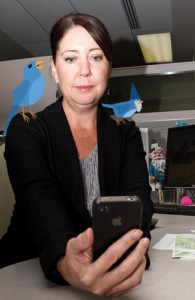Students moving toward social media for networking, job searches
by Zoey Duncan
Publishing Editor
The start of a new semester means more impending deadlines and higher heart rates. Students are now

Photo Illustration by Steele Duncan & Jorden Dixon Karen Richards of Mount Royal’s communication and marketing department runs social media — including a couple of the school’s official Twitter accounts.
beginning to think of a summer a head that needs to be filled as much with feverish productivity as frothy pilsners. And from business to communications to ecotourism, most people will tell you that finding a good job in your industry is more about who you know than what you know.
Increasingly, students and professionals are using Twitter as a way to expand their networks. Twitter is the social media site that lets users deliver updates and share links in text message-sized bits.
Amanda Matchett, community manager and social media guru for Podium Participation Funds in Calgary, said it’s “incredibly important” for students at the cusp of their careers to learn to use Twitter effectively.
“I know a lot of people in Calgary who are younger aren’t using it and I think it’s a huge advantage to those who are, because it puts you that much farther ahead than everyone else,” said Matchett, who gained her current position after building her online identity through Twitter, Facebook, LinkedIn and her blog.
Most Calgarians should recognize the potential in a strong online identity. Mount Royal University professor and Mayor Naheed Nenshi rose in popularity on a social media mayoral campaign platform last October.
Nenshi’s campaign manager Stephen Carter said the two of them liked the person-to-person aspect of Twitter. “An old-style campaign is: meet as many people as you can, on their turf, where they live, (and) tell them messages they’re receptive towards,” Carter said. “And that’s what Twitter was so interesting for, is we could meet people on Twitter and then they took forth our messaging to others. It was really powerful that way.”
While Carter was successful in helping the already Twitter-savvy Nenshi use the medium for his campaign, he typed his way into controversy and out of a job in fall 2009 when he was a Wildrose Alliance strategist. CBC News reported that Carter’s tweet, which made fun of Premier Ed Stelmach’s accent, was not the reason for his leaving the job. However, Carter told The Reflector, “I got myself into a lot of trouble on Twitter” in the past.
Students on Twitter must be aware of the line between professional and personal tweeting said Karen Richards, who operates Mount Royal’s social media accounts.
“What you say on Twitter, just like any other social media site, is permanent,” Richards said. “The Internet remembers every single thing you write, so think before you post.”
Mount Royal set up a Facebook account around 2006, and it took years of pushing by Richards until the school was comfortable with using relatively informal Twitter as a marketing tool. Now Richards uses Twitter to respond to people’s questions through the mountroyal4u account, and spends up to 10 hours a week monitoring statements made about the school, including parking and weather-related tweets, as well as keeping up the school’s Facebook and YouTube profiles.
While Twitter is sometimes compared to Facebook, Richards points out that users of each will build vastly different networks.
The people you follow on Twitter are “people that you’re choosing based on the industry that you have in common,” Richards said. “Whatever you as a student are passionate about and could talk about for hours, there’s thousands of people out there that are the same, and so, using Twitter, you can talk about it for hours. And some of them are at a high level, like maybe a professional in your industry, (and they’re) totally loving and willing to talk to you .”



